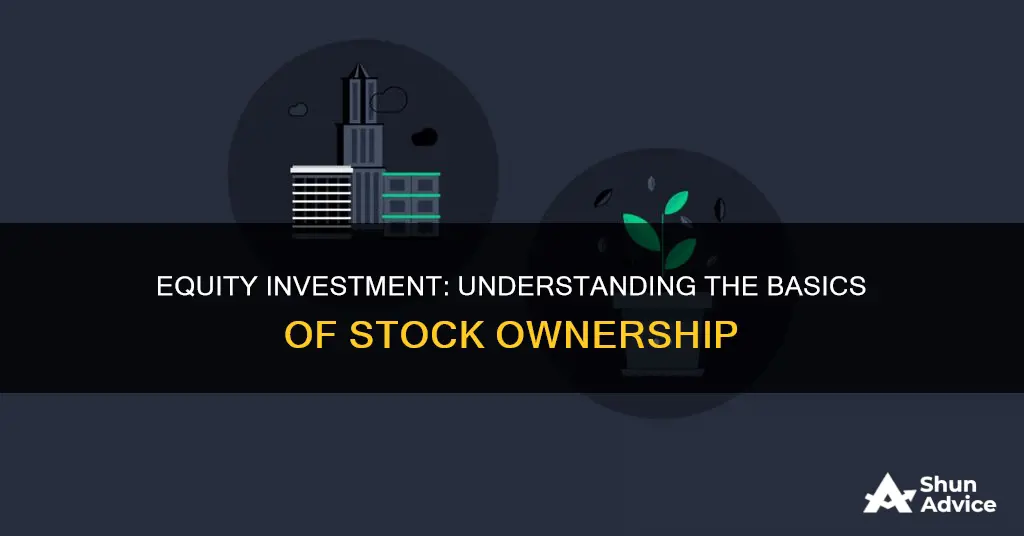
Equity investment is a crucial aspect of financial decision-making and analysis. It involves investing in a company by purchasing shares, becoming a shareholder, and gaining certain rights and benefits associated with ownership. Equity investment is a broad topic that encompasses various elements, including shareholder equity, private equity, and equity accounting.
Shareholder equity, also known as owner's equity, represents the amount of money that would be returned to shareholders if a company's assets were liquidated and all debts were paid off. It reflects the value of an investor's stake in the company and is calculated by subtracting total liabilities from total assets.
Private equity, on the other hand, refers to the evaluation and investment in companies that are not publicly traded. This type of investment is typically only accessible to accredited investors with a certain level of wealth.
Equity accounting, or the equity method, is an accounting technique used to record investments in associated companies. It is applied when an investor has a significant influence over the company they are investing in, usually owning 20-50% of the voting stock.
Understanding equity investment involves grasping these concepts and their implications for financial reporting, analysis, and decision-making.
What You'll Learn
- Equity investment is money invested in a company by purchasing shares
- Equity investors buy shares with the expectation that they will increase in value
- Equity investments can strengthen a portfolio's asset allocation by adding diversification
- Equity investments can increase the value of the principal amount invested
- Equity accounting is an accounting method for recording investments in associated companies

Equity investment is money invested in a company by purchasing shares
Equity investment is money that is invested in a company by purchasing shares of that company in the stock market. These shares are typically traded on a stock exchange. Equity investors purchase shares of a company with the expectation that they will rise in value in the form of capital gains and/or generate capital dividends.
Equity investment is often sought after by investors as it provides a greater opportunity to share in the profits and growth of a company. Investors may also be able to increase their investment through rights shares, should a company wish to raise additional capital in equity markets. Equity funds offer investors a diversified investment option, typically for a minimum initial investment amount.
Equity investment is also associated with certain risks. Market risks impact equity investments directly. Stocks will often rise or fall in value based on market forces, which can result in investors losing some or all of their investment. Other types of risk that can affect equity investments include credit risk, foreign currency risk, liquidity risk, political risk, economic concentration risk, and inflation risk.
A statement of equity is an important component of the balance sheet used to determine a company's financial health. It is a helpful tool that provides data used to address budgetary concerns, manage stocks, interact with shareholders appropriately, and make financial adjustments.
Equities: A Smart Investment Choice?
You may want to see also

Equity investors buy shares with the expectation that they will increase in value
Equity investors have a stake in the company and own a piece of it. Equity investment is money that is invested in a company by purchasing shares of that company in the stock market. These shares are typically traded on a stock exchange. Equity investors benefit from an increase in the value of the principal amount invested. Equity funds offer investors a diversified investment option, usually for a minimum initial investment amount.
The main benefit of equity investment is the potential to increase the value of the principal amount invested. Investors may also be able to increase investment through rights shares if a company wishes to raise additional capital in equity markets. Equity investments can strengthen a portfolio's asset allocation by adding diversification.
While there are many benefits to investing in equities, there are also risks. Market risks impact equity investments directly. Stocks will often rise or fall in value based on market forces, and investors can lose some or all of their investment due to market risk. Other types of risk that can affect equity investments include credit risk, foreign currency risk, liquidity risk, political risk, economic concentration risk, and inflation risk.
Equity investors buying shares with the expectation that they will increase in value is an accurate statement regarding equity investment. Equity investors seek to benefit from the potential increase in the value of their investment and receive capital gains and/or dividends.
Partnerships: Equity Investment or Strategic Alliance?
You may want to see also

Equity investments can strengthen a portfolio's asset allocation by adding diversification
Equity investments, such as stocks, typically make up a significant portion of an individual's or institution's investment portfolio. Stocks are generally considered to be more volatile than other types of assets, such as bonds or cash, but they also offer the potential for higher growth over the long term. By including stocks in a portfolio, investors can increase their exposure to this aggressive portion of the portfolio, potentially boosting overall returns.
However, it is important to diversify equity investments within a portfolio to manage risk effectively. This can be achieved by investing in stocks of different sizes (small, medium, and large companies), across different sectors (technology, consumer, healthcare, etc.), and in different geographic regions (domestic and international). This type of diversification helps to reduce the impact of market volatility and can provide a more stable investment portfolio.
Additionally, investors can further diversify their equity investments by combining them with other types of assets, such as bonds, cash, or alternative investments like real estate or commodities. These asset classes often behave differently in changing economic and political conditions, so including them in a portfolio can help smooth out the ups and downs of the stock market and provide a more balanced risk-return profile.
Regular rebalancing of a portfolio is also crucial to maintaining the desired level of diversification and risk. Over time, the performance of different investments can cause a portfolio to drift away from its target allocation. By periodically reviewing and adjusting holdings, investors can ensure their portfolio remains aligned with their risk tolerance, investment goals, and time horizon.
Investment Managers: Sharing Personal Information?
You may want to see also

Equity investments can increase the value of the principal amount invested
Equity investors purchase shares of a company with the expectation that the shares will rise in value. If the equity investment does rise in value, the investor will receive the monetary difference if they sell their shares or if the company's assets are liquidated and all its obligations are met.
Equity investments can also lead to capital gains. Capital gains refer to the profits made from the sale of an asset, such as stocks or real estate. When an investor purchases shares of a company, they are essentially buying a portion of the company's assets. If the value of those assets increases, the investor's share of those assets also increases in value. This can lead to capital gains when the investor sells their shares.
In addition to capital gains, equity investments can also generate dividends. Dividends are distributions of a company's profits to its shareholders. When a company makes a profit, it may choose to retain some of those profits for reinvestment or distribution to shareholders in the form of dividends. Dividends can be paid out in a variety of ways, including cash payments, stock dividends, or property distributions.
Overall, equity investments offer the potential to increase the value of the principal amount invested through capital gains and dividends. This makes equity investments an attractive option for investors seeking to grow their wealth over time.
Diverse Investment Portfolios: What's the Right Mix?
You may want to see also

Equity accounting is an accounting method for recording investments in associated companies
Equity accounting, also known as the equity method, is an accounting process for recording investments in associated companies or entities. It is used when a company has a significant but not controlling interest in another company, typically owning 20-50% of the voting stock of the associate company.
The equity method is applied when an investor or holding entity can exert a significant influence over the investee or owned company. This influence can be in the form of representation on the board of directors, participation in policy-making, material intra-entity transactions, or technological dependence, among other factors.
When using the equity method, the initial investment amount is recorded as an asset on the investing company's balance sheet. The investing company then records its share of profit or loss in the income statement for the year. If the investee company records a profit, the investment value increases, while losses would decrease the investment amount on the balance sheet. The equity method also requires periodic adjustments to the value of the asset on the investor's balance sheet.
The equity method is used to ensure that the investor's accounts accurately reflect the investee's profit and loss. It provides a way to track the interest of one company in another and is particularly relevant when a company owns part of another. It offers a more complete and accurate picture of the economic interest that one company has in another, allowing for more consistent financial reporting over time.
Importing Your Portfolio to Investing.com: A Step-by-Step Guide
You may want to see also
Frequently asked questions
Equity is the amount of net money owners have invested in their business, including earnings gained after distributing payments to investors. It is calculated as the difference between all the assets and liabilities recorded on a shareholder's balance sheet.
Equity and debt are routinely compared to determine a company's profit margins. Equity represents ownership in an asset or company, while debt is money owed by a company to an external party.
Investors use equity as a benchmark for determining whether a particular purchase price is expensive. For example, if a company has historically traded at a price-to-book value of 1.5, an investor might think twice before paying more than that valuation.







